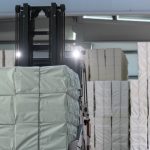Black toilet paper – Renova’s big gamble
They say that black is never out. And as every woman knows, that little black cocktail dress mixed with a few essential primary coloured accessories is a staple in every wardrobe when lost for time to buy something new for that special event.
But can that maxim really extend to items of personal hygiene? Apparently it can. Today, you can buy black organic tampons and no-one would raise an eyebrow. That liberating freedom of choice is largely thanks to a hitherto not well-known tissue paper company from Portugal called Renova that exploded onto the International scene in 2006 after coming up with a bold, daring and potentially suicidal marketing plan for its toiletries division.
When rivals like British brand Andrex, producing soft, quilted, snow-white toilet paper marketed with the traditional but beloved golden retriever puppies chasing feathers and frolicking with the under fives, seemed to have cornered the market with “fluffy” and “cuddly”, Renova did exactly the opposite and put the cat among the pigeons by introducing black toilet paper.
What were the marketing team at Renova thinking? I mean black is hardly a godly colour, if black is a colour at all. This could only appeal, after all, to the ‘adult’ stores industry, hiding coyly somewhere on the shelves between black sheets and rubber wear. Not so.
The President of Renvoa, Paulo Miguel Pereira da Silva, reminisced on the risqué decision at an annual dinner organised by the French Chamber of Commerce and Industry (CCILF) for several chambers of commerce on the occasion of the ‘International Dinner and Forum’ at the Sana Malhoa Hotel in Lisbon on Monday, February 19.
The event involved the participation of commercial and trade representatives from chambers of commerce in Portugal from Germany, China, Colombia, Spain, United Sates, United Kingdom, France, Netherlands, Hong Kong, Hungary, Indonesia, Italy, Japan, Morocco, Mexico, Switzerland, and Turkey with the event hosted by the President of the Spanish Chamber of Commerce and Industry in Portugal, Miguel Seco.
This international forum aims to promote the internationalisation of Portuguese companies, aimed at Portuguese companies, members or not, with interests in commercial exchanges with the aforementioned countries.
The shock of the new
Paulo Miguel Pereira da Silva, who speaks Portuguese and French, was one of two guest speakers at the event — the other being the President of the Portuguese Industrial Confederation (CIP), Armindo Monteiro.
da Silva stumbled upon the idea for black toilet paper when thinking about the notion of “spectacle” and how it relates to consumer products while attending a trade show in Las Vegas. “It came to me that black was an intuitive colour because it signals ‘avant-guard, creative work’.
In terms of design, he told the New York Times, black means “irreverence and the core nature of art” which, in the words of the famous Australian art critic Robert Hughes means ‘the shock of the new’.
He stressed that the new product was neither just a product, an object, nor a communication tool, but a combination of the three. He also admitted in the article that when he stocked the bathrooms at party functions, the guests tended to pinch the rolls.
Not everybody thought it was a good idea. The US design theorist Henry Petroski thought that ‘shock’ and ‘bathroom’ are a very “unhappy couple”, at least combined outside a nightclub setting.
He thought that most people who used the bathroom wanted something comfy and reassuring. “They want calm and solitude” not “distraction”. And there certainly was the danger of conjuring a sense of being off set at the filming of a remake of Rosemary’s Baby.
A love of experimenting
Yet despite the initial misgivings from design, hospitality and retail leaders in the United Sates, Renova managed to pull off the high-risk strategy and it became a success. Today Renova is a household name and forever synonymous with black toilet paper, even though the company produces toilet rolls in all of the colours of the rainbow, as well as kitchen rolls and tissues.
“I have a passion, and it is one of the reasons why I have stayed at Renova all these years, it is that I like people, which for me was a big discovery,” said Paulo Miguel Pereira da Silva who had studied in the small northern city of Abrantes before taking a degree in physics in Switzerland because “I liked understanding how the world and the universe works”.
The Renova president then decided to do a spell of work experience in industry and has continued in his experiments and experiences ever since.
Paulo Miguel Pereira da Silva pointed out that one of the experiences he had never had as an adolescent was being “part of groups” and discovered when he started work that he really enjoyed working with and coaching people.
“I think we have excellent and motivated people here in Portugal with enormous capacities to do things.”
For 12 years in the 1980s and 1990s he worked as an engineer on the day-to-day organisation and running of the factories — the company at that time had two mills — and then was suddenly thrust into the big chair as president and had to deal with the commercial and marketing side of the business as well.
An Internationalisation strategy
In 1989 Renova started its first modern cross-category line of product (Renova Class) with a view to internationalisation.
The first step came in 1990 when the company opened operations in Spain, Renova España SA. Towards the end of the decade Renova launched the first toilet paper in the world integrating micro-droplets of smoothing cream (“Renova Fresh&Clean”
“We had begun our internationalisation strategy and it had been going so well” he recalled. In 2002, Renova France began operations in that country launching its innovative ‘Fresh&Clean’ toilet paper that became the company’s main market driver in that market. Within two years the company expanded into Belgium and Luxembourg, opening Renova Belgium in 2004.
And recalls: “It was a very difficult process, we started in Spain and then the natural move in terms of markets was France where the French retailers were important (France was and is famous for its hypermarkets) and Renova managed to built a presence among these large retailers”.
Major branding reform
In 1995 the company launched a major branding reform with all products starting to take the brand name Renova.
Paulo Miguel Pereira da Silva wanted to focus on the brand and take it to the world. Creating and building a brand, he says, is a slow process with a medium to long-term investment, but the brand is important because it is what makes the product different and stand out from competitors.
“We defined the brand as the most important thing for Renova’s development, and everything we had to do needed to be anchored around the brand. In Portugal we didn’t have great resources, but we did have talented people. We had to come up with a brand for our products that made them different,” explained Paulo Miguel Pereira da Silva.
A brand, he stresses, is something intangible, fictional, can represent values, innovations, dreams and aspirations. “We are really good in Portugal at producing things very efficiently — robotised assembly lines, factories, mass-manufactured goods -, but not so good with brands; we tended to come up with brands for third parties who then sold them on and the value stayed with them.”
Renova Black
It was the development of black toilet paper, however, which really catapulted the Renova brand onto the International stage where today it exports to 90 countries worldwide.
It became known to a wider public (outside of Portugal) through an advertising campaign (first launched in 2002) that made use of sex appeal to sell toilet paper — something other companies didn’t dare to do before.
In 2013 Renova’a production director, Mário Lopes told Tissue Magazine: “Our strategy is through innovation. We want to increasingly sell unusual tissue products internationally; we are already known as the “black toilet paper company” and this brings a lot of visibility to the brand.”
The campaign, using photos made by the French photographer François Rousseau, received special attention of the French magazine Photo, which promoted a photographic contest inspired by it (and sponsored by the company). This was backed up with the slogan “the sexiest toilet paper on earth”
“It was an innovation that had to do with creating a new product, a commodity that everyone uses, but people were ashamed to buy, yet ended up by becoming an iconic product that was no longer banal but different.”
And apart from worldwide fame with the article in the New York Times, the Renova Black innovation brought something else, equally if not more important to the company and the one-time physics student who dreamt of coming up with one small innovation that would make a difference — respect from industry and legitimacy from the world.
“Before Renova Black when I went to meet the potential buyers of a large Spanish retailer I had to explain who we were, what we did and the brands that we had. Now, even in South Korea, if I say that I’m from Renova and we produce black toilet paper I have a passport to enter their market.
As CIP’s Armindo Monteiro said, “It showed how a company was able to produce a brand and build it from a country that did not really have a tradition of brand building in this area, from a product that being disposable does not bring added value or a superior technology, yet turn it into one that is internationally famous and in terms of quality is among the best in the world.”










